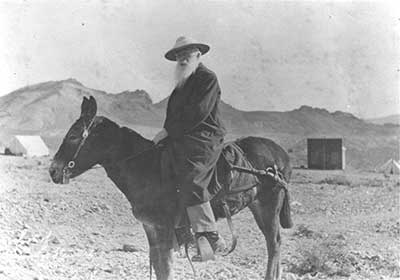Mining Reform
 The western United States has greatly changed since the 1872 Mining Law was passed.
The western United States has greatly changed since the 1872 Mining Law was passed.
Metal like gold, copper, uranium and silver used to be the most precious western resource. Now, it's clean, abundant water.
But the Mining Law, enacted by President Ulysses S. Grant over 135 years ago, hasn't changed with the times.
It still gives public minerals and public land away for less than the price of a hamburger.
And it still contains no environmental provisions. The gap-filled regulatory patchwork that (tries) to fill the void has left a tragic legacy of multi-billion dollar cleanups, poisoned water, poisoned communities, and hundreds of thousands of abandoned mines.
But there are ways forward.
Uranium: governing it like other fuel minerals
Extraction of all other fuel minerals -- coal, oil and gas -- is governed by leasing, which is a marked improvement over the 1872 Mining Law's archetypal mining claims. Leasing allows land managers to develop energy sources in a manner more consistent with current and future generations' interest in clean air, land and water. Extractors of leased fuel minerals also pay a real royalty.

Nevada Senator William Stewart, father of the General Mining Law of 1872
That's why we support passage of URSA (Uranium Resources Stewardship Act) which would make uranium a leased mineral like other fuel minerals -- and regulate like other fuel minerals as well.
The Mining Law: bringing it into 21st century
Earthworks supports legislation that modernizes the Mining Law. Legislation that protects clean water, gives land managers greater discretion to deny mines where appropriate, and returns a fair payment to taxpayers for their minerals.
With Earthworks and community support, mining reform bills that meet this criteria have passed the House of Representatives with regularity over the past 20 years.
We are in regular dialogue with western Senators to win passage in the Senate.
Abandoned mines: cleaning up a toxic legacy
Unlike coal mining companies, the hardrock mining industry pays no fee to reclaim the 1872 Mining Law's toxic legacy of hundreds of thousands of abandoned mines. The EPA estimates it will cost $50 billion to reclaim them.
Earthworks supports a two-pronged approach to abandoned mine reclamation:
- Levying a small fee on all hardrock mining in the U.S. -- similar to what coal pays -- the funds from which would be dedicated to abandoned mine cleanup
- "Good Samaritan" legislation that would shield from Clean Water Act liability those who try to reclaim abandoned hardrock mines.
For more information:
- Earthworks: General Mining Law of 1872
- Earthworks: Abandoned Mines
- Earthworks: The Uranium Resources Stewardship Act (URSA). Fact sheet.
- Earthworks: Predicting Water Quality Problems at Hardrock Mines—an EARTHWORKS white paper
- The New York Times: A Mining Law Whose Time Has Passed
Follow Earthworks